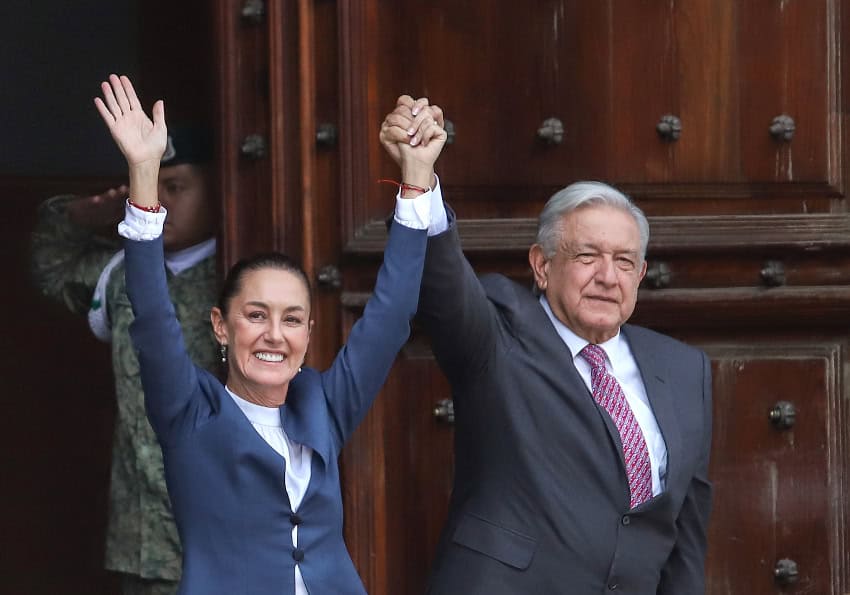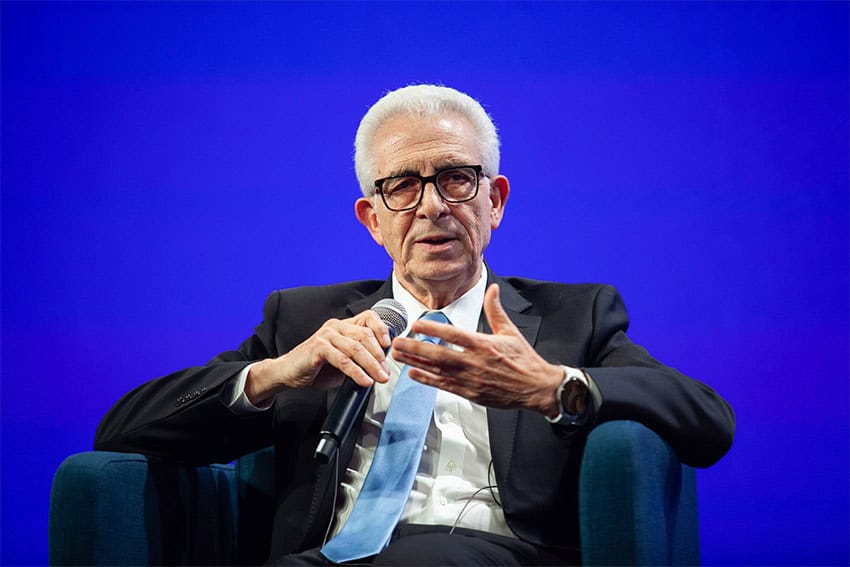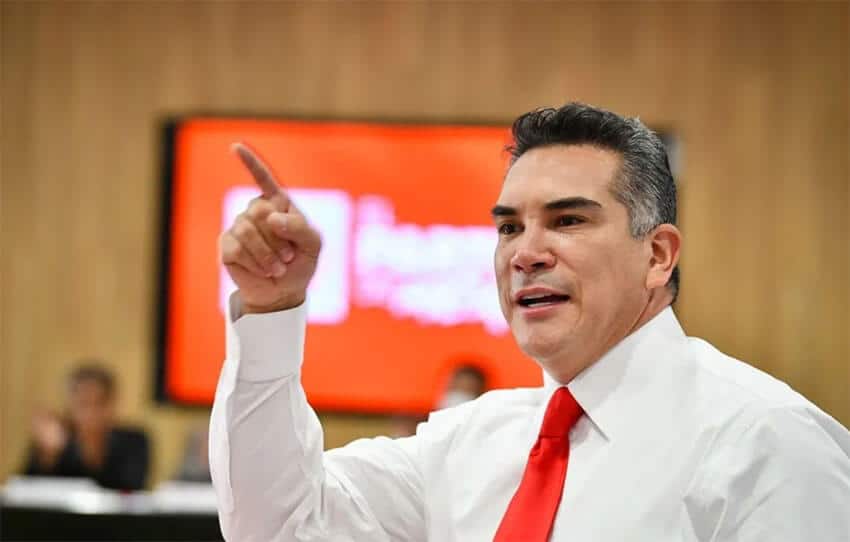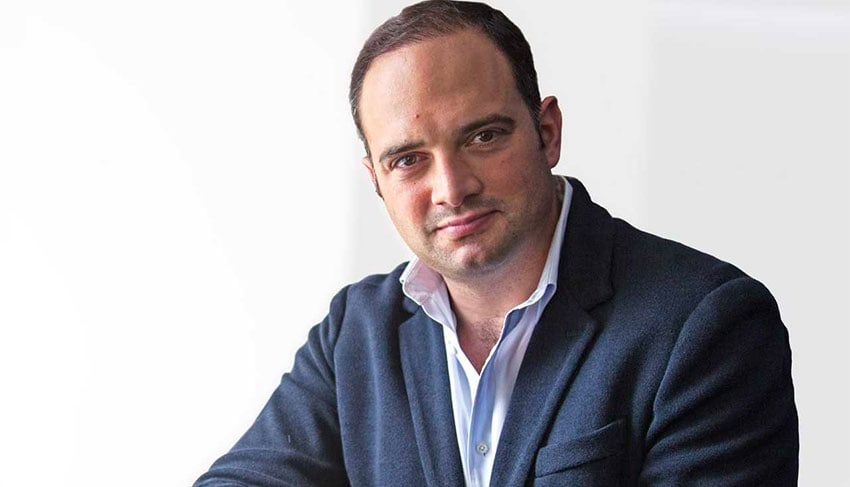During the past 12 months, Mexico News Daily reported on numerous polls that found that President Claudia Sheinbaum’s approval rating was 70% or higher, making her one of the world’s most popular leaders.
In the second part of our series examining “President Sheinbaum’s first year in office in 12 numbers,” we looked at a range of reasons why the 63-year-old former Mexico City mayor is so popular.
In this article, we’ll consider the views of some of the Mexicans who are opposed to the president, her government, the ruling Morena party and the so-called “Fourth Transformation” (4T) political project that was founded by former president Andrés Manuel López Obrador (AMLO) but which is now led by Sheinbaum.
While Mexico’s first female president is extremely popular, it is important to remember that a sizable percentage of Mexicans — 27% of the population, according to the results of the most recent El Financiero poll — do not approve of her performance.
The aim of this article is not to delve deeply into the reasons why roughly three in ten Mexican adults don’t support Sheinbaum, but rather to provide some additional perspective on why the presidenta is not universally popular.
To do this, we have compiled a collection of quotes from some of the most prominent critics of President Sheinbaum, and others, whose opinions feed into broader anti-Sheinbaum sentiment.
The quotes are categorized according to the issues they correspond to. Our publication of the views does not, of course, constitute an endorsement of them.
Much of the criticism relates to reforms that were first proposed by López Obrador. Sheinbaum is an ardent defender of AMLO’s legacy, and is perpetuating much of his political agenda as she seeks to build the “second story” of the so-called “fourth transformation” he initiated.
On the enduring influence of AMLO
While Sheinbaum wasn’t exactly handpicked by AMLO, she was widely considered the former president’s preferred successor. Sheinbaum was a minister in López Obrador’s government when he was mayor of Mexico City in the early 2000s and has looked up to — and remained loyal to — the ex-president ever since. Claims persist that Sheinbaum is essentially a “puppet” of AMLO, who has more or less disappeared from public life since concluding his presidency just over a year ago. Those claims are unfounded or justified, depending on who you speak to. While Sheinbaum’s close association with AMLO has undoubtedly helped her politically, it is also a hindrance to winning over Mexicans who were staunchly opposed to the 2018-24 government he led.
Raymundo Riva Palacios, a columnist for the El Financiero newspaper:
“The president governs on the razor’s edge. On one side, the need to show she has her own leadership: different, technical, and calm. On the other, the obligation to pay tribute to the man who brought her to power and who, though officially retired, has not stopped influencing every breath of national politics. The former president is not in the National Palace, but his shadow is. It seeps into the morning press conferences, into speeches and declarations, into social programs and into the reverential obedience of governors, legislators, and Morena leaders who respond more to the founder of the ‘Fourth Transformation’ than to the president.”

On welfare programs
The Sheinbaum administration has maintained all the welfare programs offered by the previous government and introduced three new ones. The outlay on the programs exceeds US $45 billion in 2025.
Senator Alejandro Moreno, national president of the Institutional Revolutionary Party (PRI).
“[The federal government] has gone so far as to manipulate the population with social programs that don’t guarantee rights or solve structural problems, but do ensure political loyalty.”
Alejo Sánchez Cano, a columnist for the El Financiero newspaper:
“Most of the social programs implemented by this government lack clear objectives, operating rules, mechanisms for social participation, and independent evaluations. In addition, they are granted based on clientelist political logic rather than to address poverty and marginalization.”
On the judicial elections
The previous government’s controversial judicial reform took effect just before Sheinbaum was sworn in as president. It allowed Mexico’s first-ever judicial elections to take place on June 1. Sheinbaum was a staunch supporter of this year’s judicial elections, arguing they were needed to renew the judiciary and rid it of corruption and other ills.
Denise Dresser, a prominent Mexican political scientist:
“The election deals a devastating blow to Mexico’s young electoral democracy, signaling a return to a competitive authoritarian regime. Morena will now dominate the executive, legislative, and judicial branches, marking the end of a thirty-year era characterized by the division of power and checks and balances.”
Former president Ernesto Zedillo:
“These elections are a farce not only in their justification but also in their execution, as has already been clearly demonstrated by events during recent months. In fact, the government has selected farcically most of the candidates, evidently without ensuring that they truly possess the professional and ethical qualifications to administer justice.”

“All the arguments put forward by former President López Obrador, and repeated by his successor, in defense of this legal and political atrocity are fallacious from start to finish. They have said, for example, that judges are also elected by popular vote in other parts of the world, citing the United States as a reference. However, they fail to clarify that this never occurs at the federal level and that only some states do so at the local level. In fact, the consensus of serious constitutional scholars around the world is crystal clear: The election of judges by popular vote undermines, and even nullifies, judicial impartiality, independence, and integrity.”
Former president Felipe Calderón:
“The judicial branch is [now] in the hands of militants and supporters of Morena. Some of … [the new judges] were lawyers of narco-traffickers, others are people without experience.”
Norma Piña, Supreme Court justice from 2015-25, chief justice from 2023-25:
“The demolition of the judiciary … is not the way to build the peace, justice and reparation Mexico so desperately needs.”
On the disbandment of government autonomous agencies
Seven autonomous government agencies were disbanded as a result of a constitutional reform that was approved by Congress late last year. The reform proposal was submitted to Congress by López Obrador, but was also supported by Sheinbaum. The National Institute for Transparency, Access to Information and the Protection of Personal Data (INAI), the Federal Economic Competition Commission (Cofece) and the National Council for the Evaluation of Social Development Policy (Coneval) were among the agencies that were eliminated, their functions absorbed into other government departments.
Alejandro Moreno:
“The elimination of these autonomous bodies represents a direct attack against the rights of Mexicans and against democracy itself.”
The Mexican Employers Federation (Coparmex):
“This measure, justified under the argument of austerity, severely compromises democratic stability and the balance of powers in our country.”

On huachicol fiscal
Allegations that members of the Mexican Navy — a highly-trusted security force — and customs employees engaged in a fuel smuggling/tax evasion scheme via an illicit practice known as huachicol fiscal was the biggest government corruption scandal of the first year of Sheinbaum’s presidency.
Jorge Romero, national president of the National Action Party:
“The famous huachicol fiscal is not a minor matter. It’s the largest corruption scandal in the history of Mexico, much bigger than even the 5-billion-peso Master Fraud or [the] 15-billion peso Segalmex [scandal]. With huachicol fiscal we’re talking about approximately 200 billion pesos of corruption every year. You can ask me, what does that mean? It means that while you pay your taxes, others evade them through networks of complicity with authorities emanating from Morena who are filling their pockets.”
“It’s literally organized crime, but from the government, in the government.”
On government austerity
Like the previous government, the Sheinbaum administration says it is committed to austerity and the responsible management of public money.
Javier Garza Ramos, a journalist for various media outlets including Latinus:
“Austerity ends up creating problems. For example, this is closely related to the issue of medicine shortages, which is another of the big problems that President Claudia Sheinbaum inherited and which she hasn’t yet been able to solve.”

On public security
Homicides declined significantly during Sheinbaum’s first year in office, but insecurity remains a major problem in various parts of Mexico, including Guanajuato — the country’s most violent state — and Sinaloa, where rival factions of the Sinaloa Cartel have engaged in a bloody war over the past year.
Javier Garza Ramos:
“Although this government has boasted about a reduction in homicides, it has had to recognize an increase in extortion. It has also had to deal with hot spots, such as the violence in Sinaloa.”
National Action Party Senator Lily Téllez:
“The reality is that the Mexican state can’t combat the cartels because if the Mexican state were able to combat the cartels, it would have already done it, right?”
“This government is clearly associated with the cartels.”
On alleged corruption
Sheinbaum frequently states that her government does not tolerate corruption and is committed to “zero impunity.”
Not everyone agrees.
Alejandro Moreno:
“The scandals of corruption are no longer counted as isolated cases, but as entire networks of complicity: inflated contracts, unfinished public works, social programs turned into electoral spoils, appointments of friends and relatives, and shady deals that today sustain a regime that lives off rhetoric but rots in deeds. Morena did not come to banish corruption; it came to normalize it, institutionalize it, and use it as an instrument to perpetuate itself in power.”
Mexicans Against Corruption and Impunity, a non-governmental organization:
“During the first year of President Claudia Sheinbaum’s administration, we recorded 51 significant cases of corruption and impunity. All came to light during her government, although nearly half occurred in the previous administration: 47% of the cases occurred during López Obrador’s term, 10% correspond to Peña Nieto’s government, and 41% took place between October 2024 and October 2025. A special case, that of huachicol fiscal, spans the last two administrations.”
Members of Mexico’s Navy among 14 arrested in major fuel smuggling crackdown
On the so-called ‘spy law’
In July, the Mexican Senate approved legislation dubbed the “Spy Law,” which gives the federal government broad intelligence and surveillance powers. Sheinbaum has rejected claims that security authorities will be able to access citizens’ personal data, including on their cell phones, without first obtaining a judicial warrant. She also asserted that the federal government “is not going to spy on anyone.”
National Action Party Senator Ricardo Anaya, a presidential candidate in 2018:
“Big Brother is watching you. This extraordinary [Senate] session will go down in history as the darkest. Morena consolidated the #SpyGovernment: geolocation, access to your health, bank, and biometric data without a judge. We will not be accomplices.”
On alleged government censorship
In June, the Senate approved a telecommunications reform bill that had been modified after concerns were raised about its alleged limitations on free speech. Those concerns persisted even after the bill’s modification.
Institutional Revolutionary Party Senator Manuel Añorve Baños:
“Morena wants absolute control over the media and the digital ecosystem. That’s why, from the PRI Senate group, we will vote AGAINST the Telecommunications and Broadcasting Law— or rather, the #CensorshipLaw — which clearly goes against freedom of expression.”
On the alleged erosion of democracy
The popular election of judges and the abolition of autonomous agencies, among other initiatives supported by Sheinbaum, have led to claims that democracy in Mexico is under threat.
León Krauze, a prominent journalist:
“Though Sheinbaum has handled President Donald Trump’s bullying deftly, her own autocratic impulses are alive and well. She seems intent on dismantling Mexico’s democracy — a project initiated by her predecessor, Andrés Manuel López Obrador, which she is now enthusiastically pursuing.”
“Sheinbaum’s Mexico is no beacon. If anything, it’s a flashing red warning light — a cautionary tale of how democracies steadily erode under years of institutional assault by autocratically minded politicians.”

Jesús Silva-Herzog Márquez, a journalist and Reforma newspaper columnist:
“Sheinbaum has persevered on the authoritarian path and has insisted on giving the new regime all the tools for its consolidation. She is responsible for the definitive push toward the destruction of the Judicial Branch as an autonomous and professional power. It is she who has called for an electoral reform whose explicit purpose is to enforce the powers of the new majority. It is she who has proposed a legal reform to grant the government broad licenses for arbitrariness. … Sheinbaum’s ambition is to consolidate competent authoritarianism.”
Carlos Loret de Mola, a journalist and prominent government critic:
“[Sheinbaum] changed [Mexico] from the list of democratic countries to the list of authoritarian countries.”
On the alleged protection of Senator Adán Augusto López Hernández
Senator Adán Augusto López Hernández, Morena’s leader in the upper house and a former interior minister and governor of Tabasco, has been embroiled in a scandal involving his former security minister in Tabasco, who is accused of heading up a criminal group. Opposition politicians and others have claimed it is not possible that he was unaware of the alleged criminal activity of his security minister in Tabasco.
Sergio Sarmiento, a columnist for the Reforma newspaper:
“Adán Augusto won’t even be investigated. The 4T is dominated by a mafia of power made up of bigwigs who have gotten rich under the protection of the government and officials who allow organized crime to operate. They are all above the law.”
Raymundo Riva Palacios:
“Senator Adán Augusto López knows he is protected, which is why he has resisted for weeks the pressure from President Claudia Sheinbaum to step down from leading Morena in the upper house and accept an embassy post. … Neither Sheinbaum, nor a faction of Morena, nor the opposition, nor the press, nor even the United States, which has demanded it, has been able to move him, because he is backed by his patron saint: Andrés Manuel López Obrador.”
By Mexico News Daily chief staff writer Peter Davies (peter.davies@mexiconewsdaily.com)
